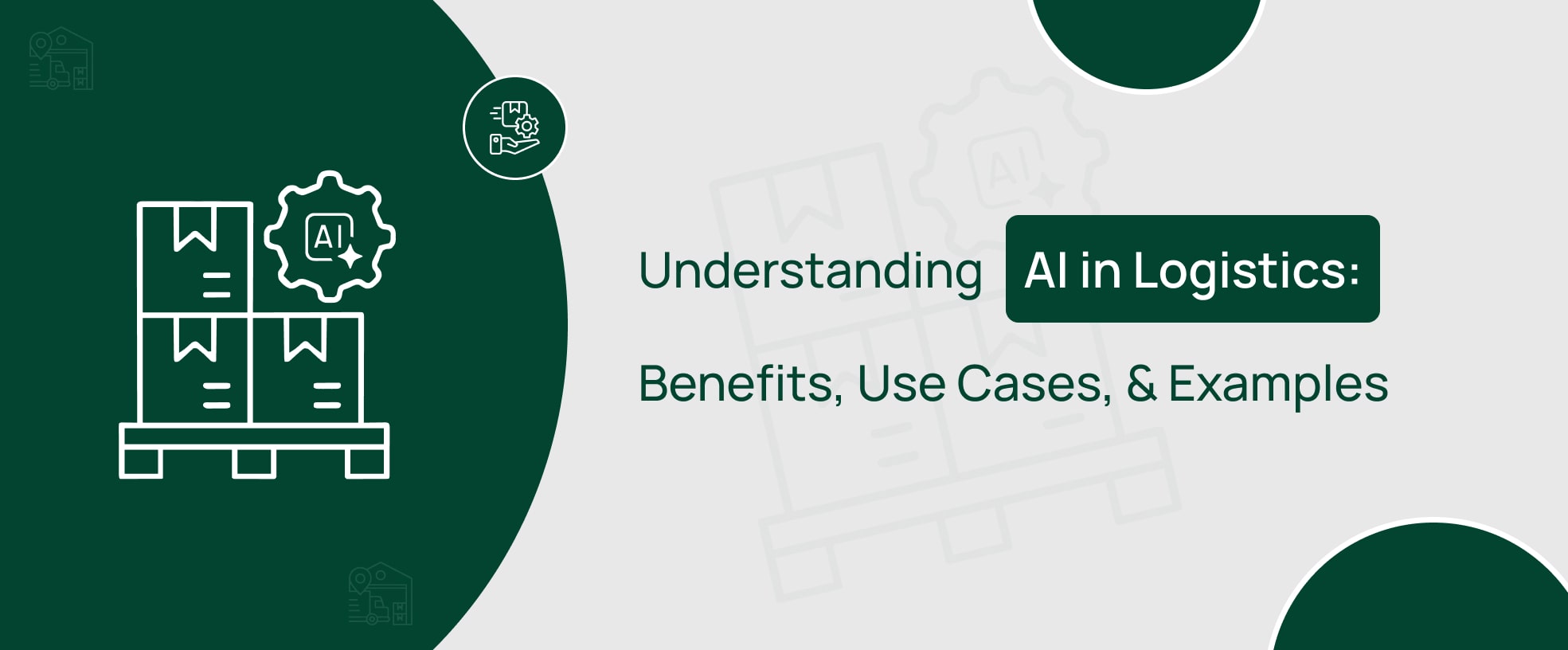Understanding AI in Logistics: Benefits, Use Cases, & Examples

AI is not all set to replace logistics; it is transforming logistics for the better. Check out how AI in logistics works like a magic wand to ensure its success! Here is a detailed view!
What is AI in Logistics?
AI in logistics means using advanced algorithms, ML, and automation to increase efficiency, accuracy, and cost savings. AI-driven systems examine large volumes of data and determine if there are potential disruptions/anomalies in the supply chain. They also give useful real-time insights that lead to efficiency, cost savings, and better decision-making.
From optimizing routes for fuel savings to managing warehouse space, inventory, and forecasting demands, artificial intelligence in logistics does it all!
AI is transforming how companies handle complex tasks that demand high costs. According to a report by McKinsey, companies that have adopted AI-driven supply chain management saw a 15% reduction in expenses, a 35% decline in inventory levels, and a 65% increase in services.
Enter the era of AI in Logistics and Get The Clear-Cut Edge! Knew These Stats?
- Global AI in the Logistics Market is projected to be around 549 billion by FY 2033 from 12 billion in FY 2023. It is growing at a CAGR of 46.7%.(Source: Link)
- Empty miles account for 20-35% of US trucking miles. Companies pay for this waste, including drivers’ wasted time, fuel, and shippers’ expenses. (Source: Link)
- Gartner says that over 80% of enterprises will have used Generative AI APIs by 2026. (Source: Link)
These stats clearly demonstrate that AI for logistics will transform it entirely, leading to overall growth.
AI is reshaping the logistics industry, making operations more efficient, reducing costs, and improving customer satisfaction. Failing to plan means planning to fail. So, is your logistics future-ready?
Top Benefits of Using AI for Logistics Operations
Unpredictable delays and static planning used to dominate the logistics market. Gone are those days now. Advanced predictive insights and automation capabilities of AI are taking logistics efficiency and accuracy to the next level.
#1 – Route Optimization:
AI-driven logistics analyzes traffic conditions, weather, delivery schedules, and more to determine the best routes. This prevents fuel wastage, leads to quicker deliveries, and increases customer satisfaction. Advanced algorithms can analyze a large data pool and suggest the delivery routes that can save fuel costs and improve delivery times.
AI in logistics provides real-time data insights into road closures, traffic congestion, etc. Also, adverse weather conditions leading to road closures can be determined.
#2 – Automating Repetitive Tasks:
AI in logistics streamlines repetitive tasks like sorting, labeling, and packaging. When handled manually, these processes consume time and are fraught with errors. AI optimizes picking, routing, and checking idle time.
It also analyzes customers’ data to predict demand, optimizes inventory, and reduces wastage by maintaining just the right level of stocks.
#3 – Inventory Management:
The success of any e-commerce or logistics business depends mainly on inventory. Inventory management is the process of monitoring and controlling inventory and helping companies to ensure that products are in the right place.
AI has transformed traditional inventory management through machine learning, data, and predictive analytics. With the help of AI, businesses can gain better insights into customers’ demands and behavior and adjust their stock levels during seasonal fluctuations. Without AI, managing the inventory of companies that keep large stocks is difficult.
#4 – Supplier management
AI analyzes vast data from various sources, including historical sales data and the latest market trends. Not only this, AI data analytics tools can also help analyze supplier performance metrics. These tools efficiently assess delivery times, quality, pricing, etc.
Businesses can use AI-driven insights to find the most trusted and cost-effective partners, negotiate the terms, and build relationships with the suppliers.
They can choose the most reliable and cost-effective partners and negotiate terms with them to form a strong supplier relationship. Logistics leaders like Unilever, Amazon, DHL etc. leverage AI to transform supply chains
In short, AI in logistics and supply chain helps in several ways. It identifies consumer behavior trends and patterns. Intelligent planning and effective warehouse management also enable the maximal utilization of warehouses. Implementing AI in logistics means cost reduction, overcoming supply chain challenges, and making better decisions.
Application And Use Cases of Artificial Intelligence in Logistics
Here are a few applications of AI in logistics that make it indispensable:
Automated Warehousing:
Robotic and AI-laden solutions are infusing efficiency in warehouse operations. These processes automate repetitive tasks like managing inventory, labeling, picking, and packing.
Automation of warehouses reduces error-laden manual tasks and brings accuracy plus efficiency.
Demand Forecasting:
The latest machine learning algorithms analyze a high volume of data, prevalent market trends, and other external factors for demand forecasting. This enables the businesses to keep their stocks updated and prevents wastage.
Predictive Maintenance & Damage Detection:
AI-laden predictive maintenance analytics monitor equipment conditions in real time and locate failures if they occur. The useful insights from AI determine equipment and vehicle conditions, identify potential failures, and detect anomalies.
Stock Level Optimization:
AI uses advanced algorithms to identify sales patterns, carrier reliability, suppliers, and other factors that help maintain optimal stock levels.
Supply Chain Optimization:
AI increases the visibility of the supply chain by determining multiple data points, optimizing the sourcing process, managing transportation and distribution, etc. This reduces costs and improves efficiency.
Dynamic Pricing:
AI offers accurate dynamic pricing. It analyzes competition, market trends, and other actors before adjusting the prices, helping businesses maximize their revenues and remain competitive.
Common Challenges of Logistics and Solutions Offered By AI
AI can address hundreds of logistics challenges. Still, its adoption rate is low. Let’s quickly look at a few commonly faced challenges in Logistics.
Challenge #1 – Delayed Deliveries:
Traditionally used logistics have to manage the pressure of inefficient routes (traffic congestion, road closures, etc. This leads to high fuel consumption, delayed deliveries, price rises, and unhappy customers. Businesses also have to bear high operational costs and other hassles.
Solution:
AI offers useful data insights that identify real-time traffic, weather conditions, and other factors to suggest the best routes that prevent late deliveries. Besides that, AI-driven drones, trucks, and other devices help in efficient last-mile deliveries in congested areas
Challenge #2 – Rising Fuel Costs:
The ever-increasing cost of fuel is another major challenge faced by logistics. This makes it difficult to maintain productivity and profitability. Many logistics businesses face closure owing to rising fuel costs.
Solution:
AI tracks things like idle time, consumption for fuel usage, locates inefficiencies. Its predictive maintenance feature detects early signs of vehicles’ wear and tear to save fuel.
Challenge #3 – Labor Shortage:
Several warehouse tasks, such as picking, packing, labelling, etc., need to be handled manually. The shortage of skilled labor is an area of concern for most warehouses.Shortage of labor force is a major bottleneck especially during the peak season.
Solution:
AI-powered robots handle all the manually handled labor work like picking, packing and sorting etc. Also, they can navigate through the warehouses reducing manual labor needs.
Challenge #4 – Supply Chain Disruptions:
Supply chain disruptions become common during pandemics, war-like situations, etc. Production halts and other manufacturing or supply chain issues can harm operational efficiencies.
Solution:
AI can analyze global, weather, and economic trends to detect supply chain disruptions. AI-powered blockchain also ensures complete transparency and reduce delays.
Challenge #5 – Lack of Supply Chain Visibility:
Another big challenge for the supply chain is tracking the shipment to determine precisely where the supplies are. Not knowing where and in which condition the fleet is a problematic issue.
Solution:
With the help of AI-enabled IoT sensor technology, real-time visibility into shipment locations is possible. Their condition, temperature, arrival times, etc., can all be tracked.
Challenge #6 – Environmental Issues:
High carbon emissions from vehicles, excessive generation of waste from packaging goods, etc., cause environmental concerns
Solution:
AI in logistics can optimize routes, leading to low carbon emissions and low fuel wastage. AI-laden sensors can also track and optimize warehouse energy usage, preventing empty return trips.
Market leaders are making the best possible use of AI in logistics. Check out three of them here!
Top 3 Logistics Companies That Implemented AI in Logistics
Here are the leading names in the market that fully leverage AI in logistics. By implementing AI in logistics promptly, you can have a cutting-edge reputation like them.
Amazon:
For years, this retail giant has known the importance of AI in logistics and deployed it to improve efficiency in logistics operations. It is now turning to generative AI for more same-day shipping.
The technology is used to optimize delivery routes, enable warehouse robotics to handle repetitive tasks, and create an eco-friendly environment for employees. Amazon also uses it to determine where to stock new supplies, etc.
DHL:
DHL, the leading express logistics provider, has been using AI to streamline its supply chain operations. The company acknowledges that it has been a game changer as it has increased the sorting capacity of supplies by 40%.
DHL has partnered with Dorabot (an AI-driven robotic solution provider) to integrate DHLBots. This has improved demand forecasting, reduced delivery times, etc.
FedEx:
FedEx deploys AI-powered tracking systems and predictive maintenance to better manage its fleet, make data-driven decisions, track packages, sort warehouse operations, and more.
FedEx’s Launch of DoraSorter (AI-powered intelligent sorting robots) on teaming up with Dorabot (a robotics solution provider) has boosted operational efficiency.
How Can iCommuneTech Help You?
iCommuneTech is a reputed provider of AI-powered logistics solutions. The service provider delivers excellence in AI-driven logistics solutions that help businesses like yours enhance decision-making, improve operational efficiency, and save costs.
Get these features from its software CommuteLogix:
So, when it comes to reaping profits and increasing the productivity of your logistics, look no further! AI-powered logistics solutions provided by iCommuneTech are trusted for their efficacy.
Transform Your Logistics Today!Summary: The Future of AI Powered Logistics
In short, AI is the future of logistics. It is all set to revolutionize it by addressing the commonly faced logistics challenges. The prominent players in the market, like Amazon, DHL, and FedEx, have recognized its potential and have implemented the technology for better efficiency, productivity, and cost savings.
If your logistics operation is lagging and becoming a headache, it’s wise to match the pace with the race.
Key Takeaways:
Frequently Asked Questions About AI And Logistics
1. How is artificial intelligence used in logistics?
By leveraging advanced Machine Learning Algorithms, AI can analyze vast data to predict demands and optimize inventory levels. It also optimizes the warehouse’s route space, automates repetitive tasks, and more.
2. How does Amazon use AI in logistics?
Amazon employs advanced robotics for various purposes, such as inventory management, optimizing delivery routes, and more.
3. Will AI replace logistics?
AI is not going to replace the logistics. It will transform it for the better. Humans will be involved in making decisions and solving complex problems.
4. What are the problems with AI in logistics?
Though AI for logistics has several benefits, it also has disadvantages, like its high implementation expense and the need for advanced cybersecurity to protect data.
5.How does machine learning contribute to logistics?
Machine learning is a vital component of logistics. It improves demand forecasting, detects anomalies in the supply chain, inventory, etc, and leads to better efficiency and cost savings.
Smart Businesses Have A Strategic Approach. Get in Touch & Share Your Requirements!
We specialize in last-mile deliveries, real-time inventory tracking, and more. CommuteLogix is the software that has been trusted for more than a decade. Its advanced AI-powered logistics solutions are a boon for supply chain functionalities. Get it integrated today to stay a step ahead!
Contact us today for a free quote and demo!

